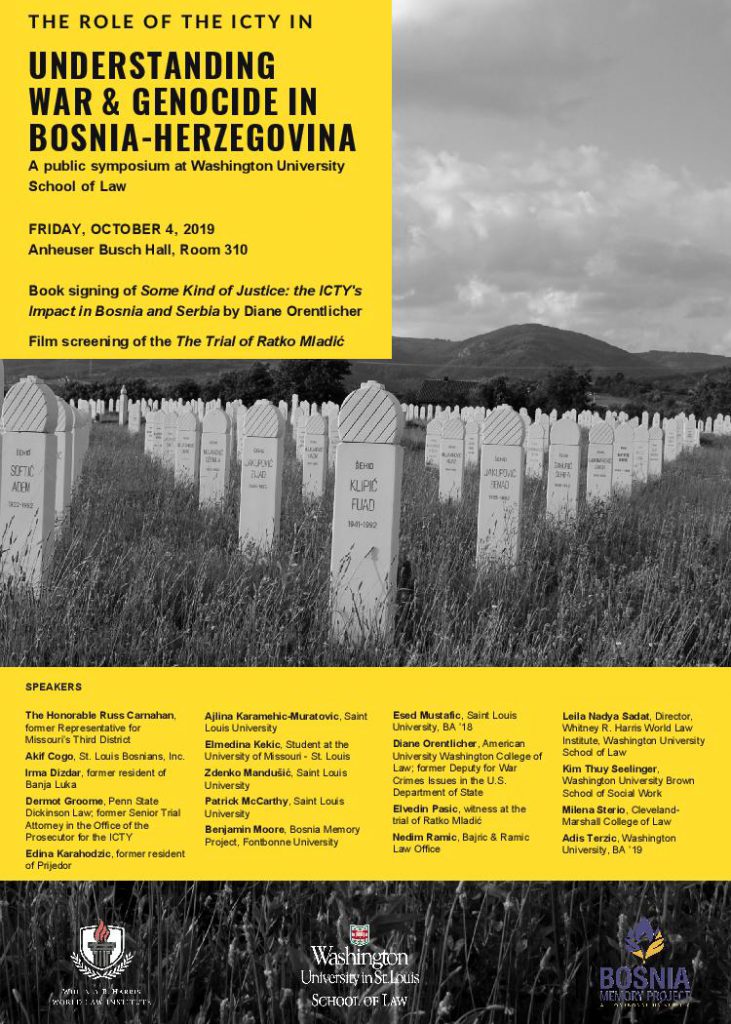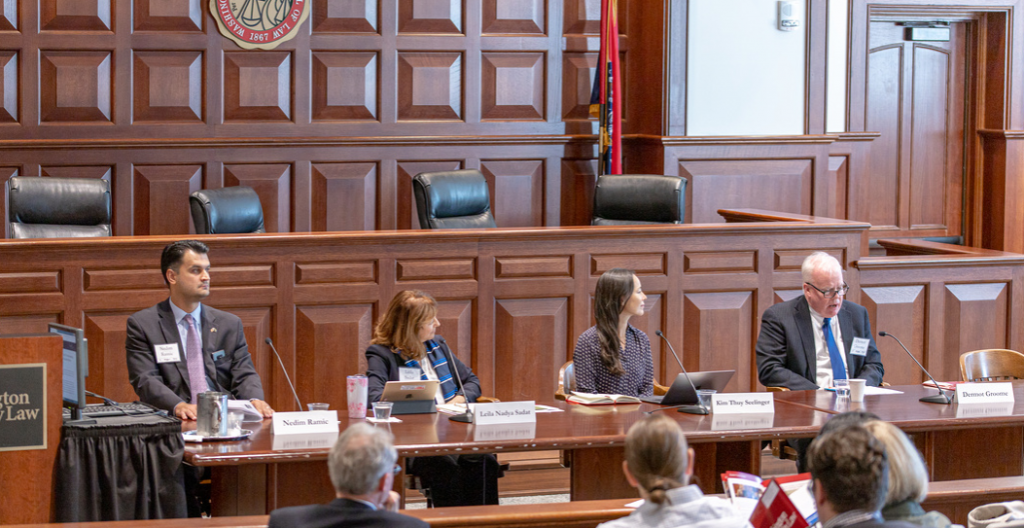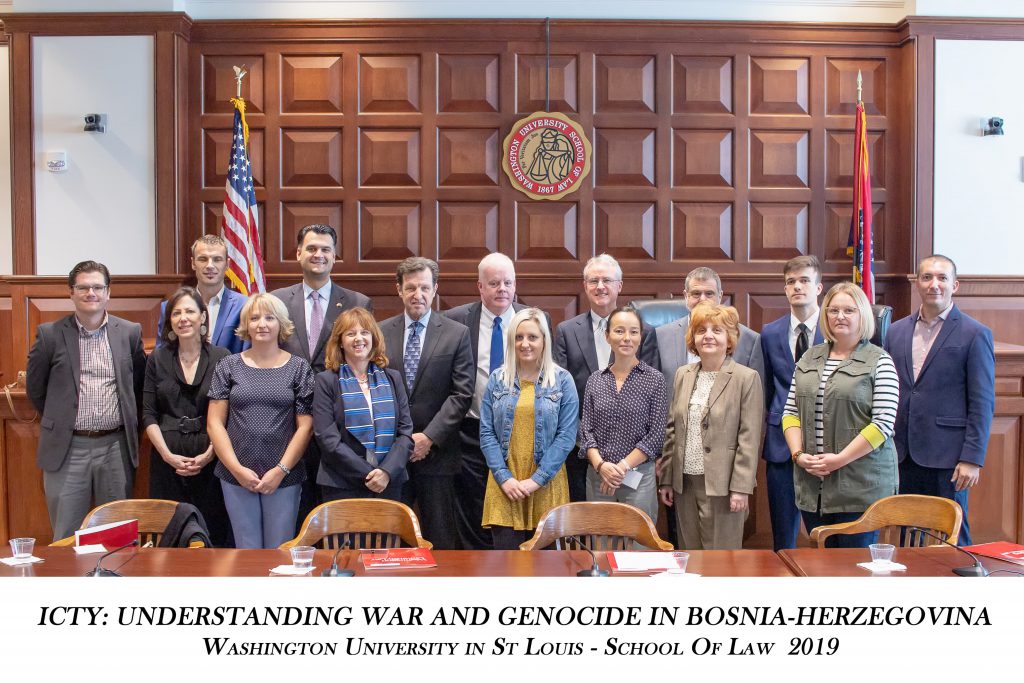By: Yuan Fang
The symposium on the Role of the International Criminal Tribunal for the former Yugoslavia (ICTY) in Understanding the War and Genocide in Bosnia-Herzegovina was held on Friday, October 4, 2019 at Washington University School of Law. This event was co-sponsored by the School of Law’s Whitney R. Harris World Law Institute, Public Interest Law & Policy Speakers Series, Global Studies Law Review, and Fontbonne University’s Bosnia Memory Project. The Symposium featured the keynote address The Role of the ICTY in Understanding War and Genocide in Bosnia-Herzegovina by Professor Diane Orentlicher, as well as three panels, exploring the legal issues regarding the ICTY (dedicated to the memory of the Honorable Judge Patricia Wald), the historical and political considerations given to the ICTY, and survivors’ stories and testimonies. The Symposium concluded with a screening of the new film of The Trial of Ratko Mladic and a Q&A with Mr. Elvedin Pasic, the first witness at the Mladic trial, and Professor Dermot Groome, senior ICTY trial attorney. This blog article reflects upon the first panel: the legal aspect of the legacy of the ICTY.

U.N. Security Council Resolution 827 established the ICTY in 1993, and its creation was met with uncertainty. Years later, it is clear the Tribunal has greatly contributed to the development of international criminal law, as noted by Professor Groome. Historically, the ICTY’s treatment regarding customary law for international crimes was ambiguous and incomplete. However, the Tribunal facilitated the birth of new customary law – known as the “ICTY jurisprudence.” In a number of landmark cases, the ICTY advanced jurisprudence in a range of areas: especially regarding gender crimes, crimes against humanity, and genocide.
The panelists specifically discussed the ICTY’s jurisprudence concerning genocide, often called the “crime of crimes.” This is a complex part of the ICTY’s legacy. The Tribunal’s contribution towards this legal arena includes providing a more precise definition of genocide and highlighting the specific intent required to prove genocide – the intent of physically or biologically destroying, in whole or in part, a group of people based on specific characteristics. Genocide is discrimination in its most violent form: “to attack persons on account of their ethnic, racial, or religious characteristics (as well as, in the case of persecution, on account of their political affiliation.” (IT-95 16-T, Judgment, 14 Jan 2000, para 636.) Despite these developments, genocide has remained difficult to prove at the ICTY and other courts. To date, the ICTY has only concluded genocide was committed in Srebrenica, and recently ruled in Karadžić that it was not committed in Bratunac, Foča, Ključ, Prijedor, Sanski, Vlasenica, and Zvornik. Professor Leila Sadat explained this is largely due to the specific intent requirement, intertwined with political discourse. The main challenge here is to “distinguish the difference between genocide and persecution as a crime against humanity,” said Professor Groome. While Professors Sadat and Groome both agreed there was evidence to support a finding of genocidal intent in Bosnia, they also agreed that genocide, as a legal matter, can be difficult to prove because the inference to intent can be uncertain. The judges’ miscomprehension of what precisely “reasonable doubt” means due to the divergence between common law and civil law systems may also increase the difficulty to prove genocide. To solve this problem, Professor Sadat suggested it should be made clearer that “reasonable doubt” does not require a judge to preclude any assumptions or hypotheses. Specifically, “there is something in the Genocide Convention saying that physical destruction is not necessary to be the only intention for genocide, I expect to see how this can be applied in future cases,” said Sadat.

The panelists also discussed how the boundary between genocide and persecution as a crime against humanity is difficult to draw. Generally, “it’s easier to prove crimes against humanity while more difficult to prove genocide,” said Professor Groome, despite “the mens rea requirement for prosecution [being] […] higher than that for ordinary crimes against humanity, although lower than for genocide.” (IT-95-16-T, Judgment, 14 Jan 2000, para 636.) Professor Sadat also stressed that when prosecuting genocide, “political dimensions need to be taken into consideration.”
The scope of crimes against humanity is much broader. The definition of Article 5 of the Statute of the ICTY has a relatively loose link to the war, not requiring a connection as per Article 6(c) of the Nuremberg Charter. Thus, crimes against humanity captures criminal behavior that occurs in both peacetime and wartime. Significantly, persecution is often the first crime to happen before a situation escalates into all-out war or genocide; prosecuting and calling attention to persecution early may be a useful tool to prevent the escalation from occurring in the first place. Professor Sadat further expressed her hope for the definition of persecution at the International Criminal Court (ICC) level to continue to broaden to capture criminal behavior, rather than becoming narrower, and as such, difficult to prove like genocide at the ICTY. She also raised the point that although crimes against humanity play a significant role in prosecution, they generally fail to draw sufficient attention. One reason for this is perhaps that, while there is a global Convention on the Prevention and Punishment of the Crime of Genocide, there is currently no such treaty for crimes against humanity. The Harris Institute has been working on such a treaty through its Crimes Against Humanity Initiative, and the U.N. International Law Commission recently completed work on this topic, submitting a full set of draft articles and commentary to the U.N. General Assembly.
Lastly, Professor Kim Thuy Seelinger discussed the wide-spread use of sexual violence in Bosnia- Herzegovina during the conflict, and the subsequent prosecution of these crimes. The ICTY is particularly noted for enabling the prosecution of sexual violence as genocide, a war crime, and a crime against humanity. In Furundžija, for example, the Trial Chamber held that “[r]ape may also amount to […] an act of genocide, if the requisite elements are met, and may be prosecuted accordingly.” (para. 172). Moreover, despite sexual violence being commonplace in wartime, it was not until the ICTY that these atrocities were actively prosecuted as such. The trial against Duško Tadić was the first time that an international war crime trial involved charges of sexual violence. Professor Seelinger also noted the significance of the ICTY Statute recognizing sexual violence’s use as a weapon of war, through its explicit inclusion of rape as a crime against humanity in Article 5. Furthermore, protection of sexual violence victims was articulated in the Rules of Procedure and Evidence. For example, Rule 92 permits the victims of sexual violence to submit testimony without having to be present in the room with their accuser, and Rule 96 asserts that consent is not allowed as a defense to the accusation of rape in certain circumstances. Professor Seelinger concluded his remarks by stating that not only has the jurisprudence and practices of the ICTY been brought into local courts, but it continues to influence practices around the region and beyond.

As a whole, this panel, and the entire Symposium, reinforced the significant legacy of the ICTY. The legal heritage of the ICTY gives us a deeper understanding of the development of international criminal law, and in particular prosecuting genocide, sexual violence, and persecution. By looking back at the jurisprudence of the Tribunal, it can advise lawyers and policymakers as to the way forward.
